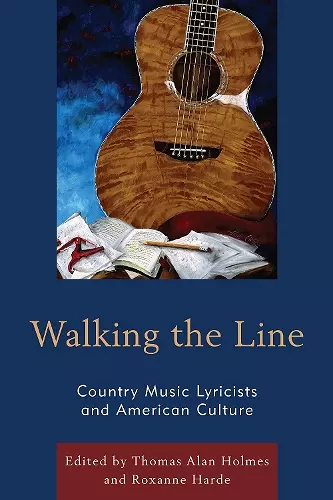Walking the Line
Country Music Lyricists and American Culture
Roxanne Harde editor Thomas Alan Holmes editor
Format:Paperback
Publisher:Bloomsbury Publishing PLC
Published:9th Oct '13
Currently unavailable, and unfortunately no date known when it will be back

An insightful and wide-ranging look at one of America’s most popular genres of music, Walking the Line: Country Music Lyricists and American Culture examines how country songwriters engage with their nation’s religion, literature, and politics. Country fans have long encountered the concept of walking the line, from Johnny Cash’s “I Walk the Line” to Waylon Jennings’s “Only Daddy That’ll Walk the Line.” Walking the line requires following strict codes, respecting territories, and, sometimes, recognizing that only the slightest boundary separates conflicting allegiances. However, even as the term acknowledges control, it suggests rebellion, the consideration of what lies on the other side of the line, and perhaps the desire to violate that code. For lyricists, the line presents a moment of expression, an opportunity to relate an idea, image, or emotion. These lines represent boundaries of their kind as well, but as the chapters in this volume indicate, some of the more successful country lyricists have tested and expanded the boundaries as they have challenged musical, social, and political conventions, often reevaluating what “country” means in country music. From Jimmie Rodgers’s redefinitions of democracy, to revisions of Southern Christianity by Hank Williams and Willie Nelson, to feminist retellings by Loretta Lynn and Dolly Parton to masculine reconstructions by Merle Haggard and Cindy Walker, to Steve Earle’s reworking of American ideologies, this collection examines how country lyricists walk the line. In weighing the influence of the lyricists’ accomplishments, the contributing authors walk the line in turn, exploring iconic country lyrics that have tested and expanded boundaries, challenged musical, social, and political conventions, and reevaluated what “country” means in country music.
Songs are the children of songwriters and, though each song carries the songwriter’s gene, each song—like each child—is an individual all its own. In this remarkable collection of essays, a group of writers examine songwriters and their songs; how they are born, nurtured and grow from a child to an independent adult. Walking the Line profiles songwriters and their offspring in a way that is intelligent, thoughtful, instructive, heart-felt, deep and long-lasting—just like a great song. -- Don Cusic, Belmont University
"Like Dolly Parton's 'Coat of Many Colors', these diverse essays are carefully stitched together by Holmes and Harde to form a many-hued portrait of the lyrics and cultural meaning in country music song writing. As the collection clearly demonstrates, the best songwriters, many times social outsiders themselves, are more likely to color outside the cultural lines of their collective audience than to acquiesce to traditional themes and beliefs. An important addition to the collective knowledge of cultural creation and easily the best such collection since Tichi's Reading Country Music." -- George Lewis, University of the Pacific
This book presents 14 essays, by a variety contributors, about 15 country-music lyricists. The order is roughly chronological, starting with Jimmie Rodgers and ending with Steve Earle. Though excerpts from the subjects' lyrics are quoted, complete lyrics are not provided. Instead, the contributors discuss the lyricists' works in their cultural context. It is common for country artists to perform songs that others wrote for them, but, interestingly, most of these essays concern lyrics that well-known artists such as Hank Williams, Merle Haggard, Loretta Lynn, and Willie Nelson wrote, performed, and popularized themselves. The exception is Cindy Walker, who was extremely successful as a lyricist but little known as a performer. Most of the essayists, including Holmes and Harde, are professors of or specialists in English and history rather than music. It is thus understandable that their discussions focus on topics such as the dominant culture, regional history, and religious views that shaped the lyricists, without delving into matters of musical style. This book is suitable for for anyone interested in American popular music and popular culture. Summing Up: Recommended. Upper-division undergraduates through faculty. * CHOICE *
ISBN: 9780739169674
Dimensions: 231mm x 154mm x 23mm
Weight: 440g
288 pages